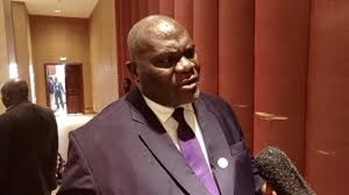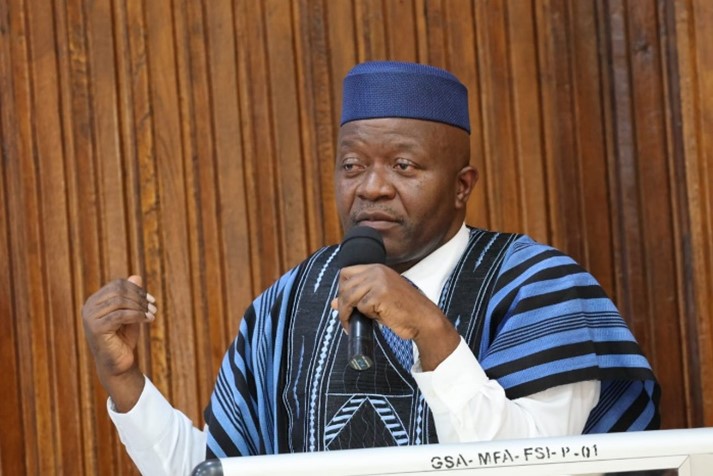The Liberian National Bar Association (LNBA) has expressed disappointment and surprise about the budgetary allocation made by the Government of Liberia (GOL) to the Judiciary Branch of government, observing that the Judiciary was treated in the past as an ordinary agency of government when it comes to budgetary allocation, which has undermined and impeded the activities of the courts and other functionaries of that branch of government.
On Monday, June 10, 2024, the LNBA issued a statement, in which it pointed out that, out of a total budget appropriation of US$738,859,837 (seven hundred thirty-eight million eight hundred fifty-nine thousand eight hundred thirty-seven United States dollars) for FY-2024 budget the Judiciary is allotted US$17 million (seventeen million United States dollars), which is very inadequate to address the pressing challenges faced by the Judiciary, including the construction of judicial complexes in counties across the nation, among others.
The bar emphasized that the rule of law is a pivotal pillar under the “ARREST Agenda” of the government, and to allot such a very low amount for an entire branch of government that has competing priorities while ordinary agencies under the Executive branch are allotted more money is a disservice to the rule of law sector, which undermines access to justice.
According to the bar, the Judiciary, in its drive to provide access to justice, has a Public Defense Program where public defenders are hired under its budget to cater mainly to indigent clients around the country. “These public defenders have not had incentives for the past years to strengthen and capacitate themselves in the work they do, and in an attempt to incentivize them it is just proper that the budget of the Judiciary be increased, because the recent budget allocated to the Judiciary in the tone of US$17 million is insufficient and unrealistic,” the bar observed.
The bar then referenced Article 72(a) of the 1986 Constitution, which says salaries, allowances and benefits of justices and judges are determined by law, and these salaries, allowances and benefits cannot be diminished. “We are all aware of the harmonization scheme that was employed by the previous government, which greatly affected the salaries, benefits and allowances of our justices and judges, which action is yet to be corrected,” the bar noted. “Also, most magisterial courts in Liberia are presided over by non-lawyers, and in order for lawyers to be attracted to serve in these positions the necessary incentives must be provided by the Judiciary. These incentives are supposed to be provided for within the budget of the Judiciary, and if they are not provided, it becomes difficult for the Judiciary Branch of Government to attract the caliber of lawyers to serve in these positions.”
Similarly, the bar said, there are debt, probate, tax and sexual offenses courts that are established in all the counties, but only a few of them have judges, while the others do not have due to budgetary allocation, which has caused the dockets of the circuit courts around the country to be overcrowded because the circuit judges have to assume jurisdictions over these various courts.
“In order for a more functional Judiciary, there must be realistic budgetary appropriations made to the judicial branch of government to enable that branch of government to render the kind of judicial services expected of it. The bar wonders why there is a huge gap between the amounts allocated to the three branches of government, which are equal under the law, even though separate but coordinate. There is segregation when it comes to appropriating amounts for each entity’s budget, with the Judiciary budget being the lowest,” the bar stated.
Besides the low budgetary appropriation to the Judiciary, the bar said it has observed, and is informed about, the lack of incentives for state prosecutors, which has undermined the work of the prosecution and dampened the spirit and morale of the prosecutors. For instance, the bar said, the lack of fees for the prosecution of cases, the provision of vehicles for state prosecutors, and adequate salaries and benefits for state prosecutors have all affected that aspect of the justice sector. The bar called on the government to give immediate attention to state prosecutors by providing adequate incentives that will boost the morale of the prosecutors in order to ensure that justice is served the people.
The bar therefore called on the Executive and Legislative branches of government to see reason in providing additional budgetary allocation to the Judiciary for FY-2024, thereby strengthening the coordination of the three branches of government as provided for under Article 3 of the 1986 Constitution.
In a related development, the LNBA says it is troubled by the failure of the President of Liberia, His Excellency Joseph Nyuma Boakai, Sr., to appoint an Associate Justice of the Supreme Court of Liberia since the death of former Associate Justice Joseph N. Nagbe, Sr. The LNBA says the filling of that seat on the Supreme Court Bench will fully constitute the Judiciary Branch of Government.






